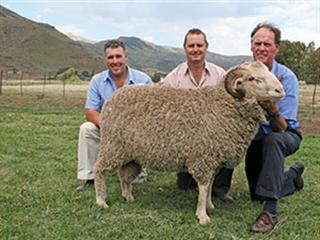“The Free State cattle and sheep herds currently comprise 25,5% of the national herd, making it the province with the largest livestock numbers in the country,” said Andre Ferreira, the Free State Red Meat Producers’ Organisation (RPO) chairperson. “I expect these numbers to increase even further in the near future because of the declining profitability of grain production caused by ever increasing input costs.” H e was talking in an interview with Farmer’s Weekly about the effect of the dramatic rise in input costs on grain production, particularly hard felt in areas with marginal soil such as parts of the Eastern Free State. “The input costs for maize, for example, in the Lindley area are now close to R4 800/ha, while the average yield is seldom higher than 3,5t/ha,” he explained.
“The input costs in the Bethlehem region are even higher and could be as high as R5 000/t. At least 2t/ha is needed just to break even. It therefore makes economic sense to change to livestock production.” e said the province is known for the excellent quality of its natural grazing and carrying capacity is relatively high on its veld which is largely open grasslands with very few shrubs and trees. There is also access to valuable feed sources such as maize and other grain rests. The downside is that provision has to made for insufficient natural grazing in winter, resulting in additional costs. The increase in input costs for grain production impacts red meat production through the sharp rises in animal feed prices.
“We nevertheless produce meat of exceptional quality in the Free State,” continued Ferreira. “Some 80% of the province’s sheep herd is reared on natural grazing, resulting in outstanding mutton. Our mutton must be marketed as such and the possibility of branding is an option being pursued by the RPO. “The problem, however, is that we allow our valuable assets to be processed outside the province, depriving ourselves of the opportunity to add value locally. We have only one abattoir of a decent capacity and lots of small ones scattered all over.
It’s critical that red meat producers start a thorough investigation into ways to add value to the industry at provincial level. Money must be generated in the province, not only outside our borders.” e said there’s an urgent need for commercial red meat producers and organised agriculture to get involved with developing farmers and livestock farmers in townships in particular. “Your guess is a good as mine about the number of cattle and sheep in townships,” he said. “I’m extremely worried about the conditions in these situations.
Not only do the animals suffer because of the total destruction of the veld in and around townships, but there is also the ever-present danger of outbreaks of diseases. I think the SPCA should get involved because these animals more often than not suffer terribly. “We’ve approached Onderstepoort on the matter of packaging vaccines and animalmedicine in smaller units to make them affordable to smaller livestock farmers. The cattle are seldom, if ever, vaccinated and some vaccines, such as for blackquarter (sponsiekte) can only be obtained in packages of 50 doses or more. It’s too expensive and small-scale farmers rather do without it. The RPO is keen to work with the Department of Agriculture in tackling the growing number of problems associated with people keeping livestock in townships.”
He said the latest trend is that small calves of one to two months old are stolen to be reared in the townships where they are nursed by a single cow. He said the practicalities of the matter are that it’s easier than keeping adult animals and quite a profitable business is possible with just two cows and a number of stolen calves. Ferreira is also deeply concerned about the situation on the Lesotho border. “The main problem currently is not only stock theft, but the fact that there’s virtually no control over the issuing of grazing permits to farmers,” he explained. “The permits give the Lesotho citizens permission to bring their animals over the border to graze in the Free State in a controlled manner.
The entire system has, however, disintegrated and permits are issued willy-nilly, sometimes even without expiry dates. The situation is untenable with the potential for a large-scale outbreak of disease. There’s no control whatsoever.” – Annelie Coleman









